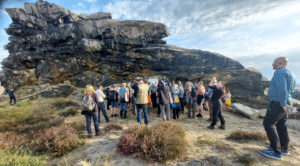INQUA 2415 my: Palaeolithic Hominins and Habitats: Out of Africa to South Asia (PaleoHome)
This project brings together experts working in India, Africa, Arabia, and SW and E Asia to address major issues related to multiple questions on the ‘Out of Africa’ story as related to chronology, palaeoenvironments and behavioural variability over the Lower Palaeolithic (Early to Middle Pleistocene), exploring similarities as also differences in evolutionary trajectories.
Abstract
Evidence of enduring preference among hominins for particular geographic places or habitats over long periods is a global phenomenon in the Palaeolithic. Sites such as Attirampakkam (ATM) (India), have evidence of Early Pleistocene Acheulian occupation contemporary with some sites in East Africa and elsewhere.
habitats over long periods is a global phenomenon in the Palaeolithic. Sites such as Attirampakkam (ATM) (India), have evidence of Early Pleistocene Acheulian occupation contemporary with some sites in East Africa and elsewhere.
Ongoing work at Sendrayanpalyam in the vicinity of the ATM suggests more variability than expected in Lower Palaeolithic assemblages in India. Comparative studies between Lower Palaeolithic assemblages and their ecological settings in key areas of both Africa and India as well as along regions of population migration, carry implications for investigating debates on the routes and timing of migrations and evolution of Oldowan and Acheulian technocomplexes.
This project brings together experts working in India, Africa, Arabia, and SW and E Asia to address major issues related to multiple questions on the ‘Out of Africa’ story as related to chronology, palaeoenvironments and behavioural variability over the Lower Palaeolithic (Early to Middle Pleistocene), exploring similarities as also differences in evolutionary trajectories. We plan to establish inclusive global networks of scientists with similar interests, embracing diversity and differences in views, to organise hybrid meetings (online, in-person in India and Ethiopia), uniting established scientists and with a prominent ECR component. Engaging with experts from multiple disciplines we will address themes related to geochronology, palaeoenvironments, technology and modelling; create a database of key sites and establish synergies with other INQUA groups working with similar goals.
A key part includes skill development amongst ECRs who will join us in engaging in public outreach and science communication to generate an awareness of prehistory among children, teachers and the wider public. Above all, this project seeks to build global networks of scientists from diverse disciplines to share ideas that can culminate in publications that explore diverse opinions on topics of key interest in the Lower Palaeolithic of India and Africa.
Objectives:
- To conduct online and field workshops (PalaeoHome_India) to delve into palaeoecological reconstructions by studying geomorphology and palaeovegetation in the vicinity of ATM and SEN in S India.
- To draw together an interdisciplinary group of scientists from diverse palaeosciences in a pair of major hybrid workshops (PalaeoHome_Global) in India (Chennai) and Africa (Addis Ababa, Ethiopia), to facilitate in-depth discussions on critical topics.
- Field and laboratory training in lithic and palaeoenvironmental studies for ECRs.
- In India as in Africa, knowledge about Quaternary sciences and prehistory is minimal. The networking opportunity, provided by the multi-year research project, particularly the diverse ECR group mentioned above, will be used gainfully for building such tangible communication grounded in the Global South, building upon the extended experience of SCHE in public outreach since 1999.
Project leaders:
- Kumar Akhilesh, Sharma Centre for Heritage Education, Chennai, India
- Prachi Joshi, Sharma Centre for Heritage Education, Chennai, India
- Mohamed Sahnouni, National Centre for Research on Human Evolution (CENIEH),Burgos, Spain
- Yanni Gunnell Department of Geography, Université Lumière Lyon 2, CNRS UMR
5600, France - Sileshi Semaw, National Centre for Research on Human Evolution (CENIEH), Burgos,Spain
- Doris Barboni, French Institute of Pondicherry, Puducherry, India
- Anupama Krishnamurthy, French Institute of Pondicherry, Puducherry, India
- Vandana Prasad, Birbal Sahni Institute of Palaeobotany, Lucknow, India
- Razika Chelli Cheheb, Centre National de Recherches Préhistoriques, Anthropologiques et Historiques (CNRPAH), Algeria

Read more about the project
Paleohome Podcast
PaleoHome ECR lecture series
The PaleoHome ECR team – Palaeolithic Hominins and Habitats: Out of Africa to India – an INQUA-HABCOM project, organizes an online lecture series for ECRs.






